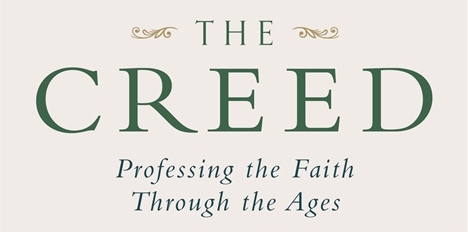Since Vatican II, very few have noticed the creed we recite at Mass every Sunday. Like many of the prayers at Mass, it became “rote” and everyone would stand up and recite “We Believe” without taking a second notice. Then a few years ago it was translated and everyone had to relearn it and stumble through words like “consubstantial.”
[featured-image single_newwindow=”false”]Emmaus Road[/featured-image]
For the most part, many people were confused why everything had to change and the new words of the creed were hard to understand. Why all the technical words like “incarnate” and “consubstantial?” That is why Scott Hahn’s latest book “The Creed: Professing the Faith Through the Ages” is a welcome introduction to the ancient tradition of reciting a “rule of faith” that unites the Church around the world.
In it popular author and renowned biblical scholar Dr. Scott Hahn takes the reader on a journey through the early centuries of the Church and examines the roots of each creed the Church has given us. He shows how the early creeds of the Church were most often used in the context of the liturgy, especially as one approached the fonts of baptism. The creed was used as a way to summarize the essential beliefs of the Catholic Church and provided new converts an opportunity to assent to her basic teachings.
Hahn goes deep into the history behind the Apostles Creed, examining how far back it truly goes, as well as the well-known Niceno-Constantinopolitan Creed or “Nicene” Creed. He gives an engaging analysis of what influenced the development of these creeds and how they were born out of a need to clarify the faith in a time of crisis.
In particular, the original Nicene Creed was developed at the Council of Nicaea in 325 in direct response to the Arian heresy that stated Jesus was not of the same “substance” of the Father. Hahn explains how,
“The creed produced by the council was, for the most part, made up of creedal statements that had been in use for generations before the council. The great exception to that rule is the word we translate as “consubstantial.” This word (in Greek, homoousios) was added specifically to counteract the poisonous doctrine of Arius. It describes the close and inseparable union between the Son and the Father. They are, literally, ‘of the same substance'” (62, emphasis added).
Hahn goes at great length to explain the development of these parts of the creed that has since stood as a summary of what we believe about God. He shows why we need words like “consubstantial” to explain our faith in order that we don’t fall into some sort of heresy and believe a false doctrine about the God we worship. Hahn also examines the debate over the word “filioque” that caused such an uproar it split the Church, creating a rift between East and West.
Creeds are necessary, especially in periods of crisis in the Church where many voices are raised and challenge the teachings of the Church. It makes one wonder if we need to make more additions to the Creed to clarify our understanding of God or various other doctrines that are being debated in the Church today.
In the end, we need the Creed, it provides for us a firm foundation for our faith and summarizes the essential beliefs of the Gospel, creating clarity in a time of confusion.
“The Creed: Professing the Faith Through the Ages” by Scott Hahn


